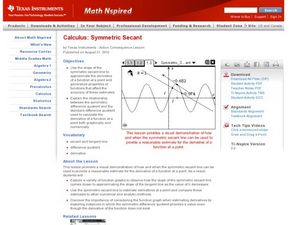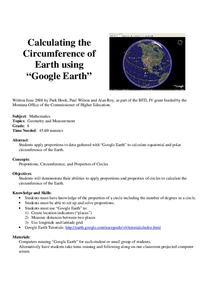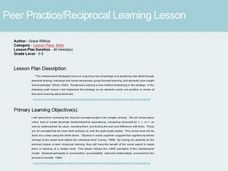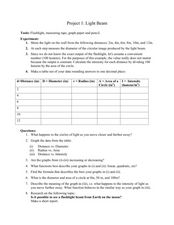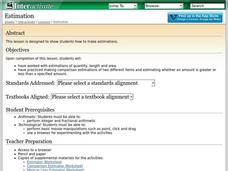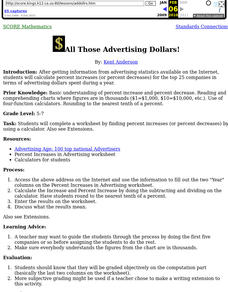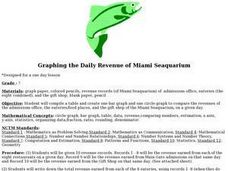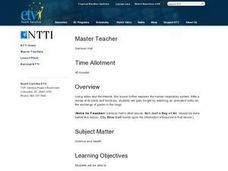Curated OER
Forms of Exponential Expressions
Your young physicists analyze the forms of four equivalent exponential expressions representing an amount of a radioactive material in a substance. They show how each expression is equivalent to the others and what aspects of the decay...
Curated OER
Connecting Formulas Related to Geometric Figures
Students identify diagrams of quadrilaterals and circles by different names and classify the figures. They name the areas for each diagram and practice solving the formulas for each.
Curated OER
Thank You... Thomas Edison!
Pupils investigate the life of Thomas Edison. They research how he made a difference. They understand that accurate data collection is important for math. They create a chart using spreadsheet data.
Curated OER
Easy Estimation
Students use estimation as a math strategy. Students estimate the number of small snacks that are presented to them. Students count the snack items after they have estimated how many there are, before the class snack on a daily basis.
Curated OER
Symmetric Secant
Mathematicians use a symmetric secant line to prove the derivative at a point. In this trigonometry lesson, students create secant lines on the navigator to analyze the derivative. They move the lines around and make observations.
Curated OER
Cells All Around
Students measure the size of an epithelial cell and to estimate the number of epithelial cells in a given area of the body. After watching a video on cells, student groups perform an experiment using a microscope to view some of their...
Curated OER
Measuring Angles
Middle schoolers explore angle measure as they estimate angle measure and measure and draw angles of less than 360 degrees. The lesson emphasizes the use of estimation when measuring angles.
Curated OER
Calculation the Cricumference of Earth using "Google Earth"
Eighth graders investigate properties of circles. In this eight grade mathematics lesson plan, 8th graders apply proportional reasoning to data gathered with “Google Earth” to calculate equatorial and polar circumference of the Earth.
Curated OER
Getting Familiar with Fractals
Young scholars use the Internet to answer lab questions about fractals, and then construct fractals using the initial stage and iteration rule. They complete tables and generate rules for the "nth" term and create their own fractals.
Curated OER
Does More Wins Mean More Fans At The Ballpark?
Students, after getting information from the past baseball season off the Internet, calculate an attendance-to-win ratio for each of the 28 major league teams and then study the results to see if winning always leads to good attendance.
Curated OER
Reciprocal Learning-Decimal Review
Students use reciprocal learning to coach one another in review of their prior learning about decimals. In this peer reciprocal learning decimal review lesson plan, students participate in conversation, accountability, roles and...
Curated OER
Light Beam
Students measure and convert between units. In this geometry lesson plan, students investigate through measurements of distances. They relate the properties of circle to solving problems with radius, diameter and area.
Curated OER
Estimation
Students explore the concept of estimation. In this estimation activity, students discuss making estimates through teacher led discussion. Students use the Internet to complete an activity where they must estimate the length of lines.
Curated OER
Using Averages to Create Graphs Through Excel
Sixth graders create and use a spreadsheet to make graphs which will be used to analyze Progress Report and Final Report Card grades. They practice finding the mean, median, mode, and range of a data set. Students also incorporate column...
Curated OER
All Those Advertising Dollars!
Students calculate percent increases (or percent decreases) for the top 25 companies in terms of advertising dollars spent during a year.
Curated OER
Graphing the Daily Revenue of Miami Seaquarium
Seventh graders compile a table of the revenues of the 8 eateries (a combined total), Main Gate admissions, and the Gift Shop.
Curated OER
Comparison of Snow Cover on Different Continents
Students use the Live Access Server (LAS) to form maps and a numerical text file of snow cover for each continent on a particular date. They analyze the data for each map and corresponding text file to determine an estimate of snow cover...
Alabama Learning Exchange
The Composition of Seawater
Students explore the concept of finding the composition of seawater. In this finding the composition of seawater instructional activity, students make a saturated salt water solution. Students discuss why there is variation in ocean...
Curated OER
CO2 Blow Out!
Fifth graders determine that carbon dioxide is a gas given off during respiration and that oxygent is the gas that is absorbed during respiration. They determine the air capacity of the lungs.
Curated OER
Five Senses: Brave Little Monster
Pupils identify which of the five senses is being used at a given time. They read "Brave Little Monster" by Ken Baker and then read the story again as they match student-made cards depicting the five senses to moments in the story.






